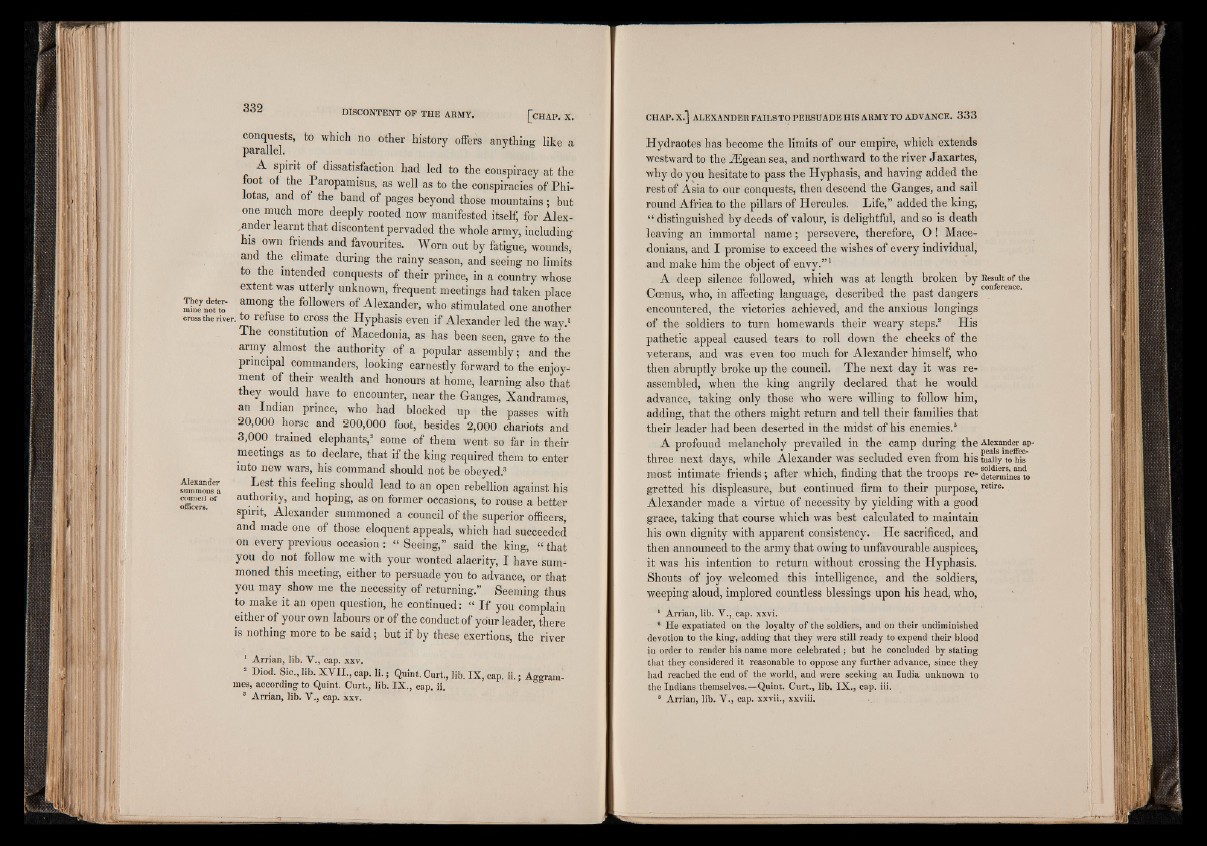
conquests, to which no other history offers anything like a
parallel.
A spirit of dissatisfaction had led to the conspiracy at the
foot of the Paropamisus, as well as to the conspiracies of Phi-
lotaSj and of the band of pages beyond those mountains ; but
one much more deeply rooted now manifested itself, for Alexander
learnt that discontent pervaded the whole army, including
hns own friends and favourites. Worn out by fatigue, wounds,
and the climate during the rainy season, and seeing no limits
to the intended conquests of their prince, in a country whose
extent was utterly unknown, frequent meetings had taken place
S f l H am°n/ the followers of Alexander, who stimulated one another
cross the river, to refuse to cross the Hyphasis even if Alexander led the way.1
The constitution of Macedonia, as has been seen, gave to the
army almost the authority of a popular assembly; and the
principal commanders, looking earnestly forward to the enjoyment
of their wealth and honours at home, learning also that
they would have to encounter, near the Ganges, Xandrames,
an Indian prince, who had blocked up the passes with
20.000 horse and 200,000 foot, besides 2,000 chariots and
3.000 trained elephants,2 some of them went so far in their
meetings as to declare, that if the king required them to enter
into new wars, his command should not be obeyed,3
S this fecling should lead to a° open rebellion against his
Sscm of aut y’ and hoPin& as on former occasions, to rouse a better
spirit, Alexander summoned a council of the superior officers,
and made one of those eloquent appeals, which had succeeded
on every previous occasion: “ Seeing,” said the king, “ that
you do not follow me with your wonted alacrity, I have summoned
this meeting, either to persuade you to advance, or that
you may show me the necessity of returning.” Seeming thus
to make it an open question, he continued: | I f you complain
either of your own labours or of the conduct of your leader, there
is nothing more to be said; but if by these exertions, the river
1 Arrian, lib. V., cap. xxv.
2 Diod. Sic., lib. X V I I ., cap. l i . ; Quint. Curt., lib. IX , cap. ii.; Aggram-
mes, according to Quint. Curt., lib. IX ., cap. ii.
3 Arrian, lib. V., cap. xxv.
Hydraotes has become the limits of our empire, which extends
westward to the JEgean sea, and northward to the river Jaxartes,
why do you hesitate to pass the Hyphasis, and having added the
rest of Asia to our conquests, then descend the Ganges, and sail
round Africa to the pillars of Hercules. Life,” added the king,
“ distinguished by deeds of valour, is delightful, and so is death
leaving an immortal name; persevere, therefore, O ! Macedonians,
and I promise to exceed the wishes of every individual,
and make him the object of envy.”1
A deep silence followed, which was at length broken by Result of the
Ccenus, who, in affecting language, described the past dangers
encountered, the victories achieved, and the anxious longings
of the soldiers to turn homewards their weary steps.2 His
pathetic appeal caused tears to roll down the cheeks of the
veterans, and was even too much for Alexander himself, who
then abruptly broke up the council. The next day it was reassembled,
when the king angrily declared that he would
advance, taking only those who were willing to follow him,
adding, that the others might return and tell their families that
their leader had been deserted in the midst of his enemies.3
A profound melancholy prevailed in the camp during the Alexander ap-
three next days, while Alexander was secluded even from his tuaiiy to his
most intimate friends; after which, finding that the troops re- determine to
gretted his displeasure, hut continued firm to their purpose,retire-
Alexander made a virtue of necessity by yielding with a good
grace, taking that course which was best calculated to maintain
his own dignity with apparent consistency. He sacrificed, and
then announced to the army that owing to unfavourable auspices,
it was his intention to return without crossing the Hyphasis.
Shouts of joy welcomed this intelligence, and the soldiers,
weeping aloud, implored countless blessings upon his head, who,
1 Arrian, lib. V., cap. xxvi.
‘ He expatiated on the loyalty of the soldiers, and on their undiminished
devotion to the king, adding that they were still ready to expend their blood
in order to render his name more celebrated ; but he concluded by stating
that they considered it reasonable to oppose any further advance, since they
had reached the end of the world, and were seeking an India unknown to
the Indians themselves,—Quint. Curt., lib. IX ., cap. iii.
3 Arrian, lib. V., cap. xxvii., xxviii.